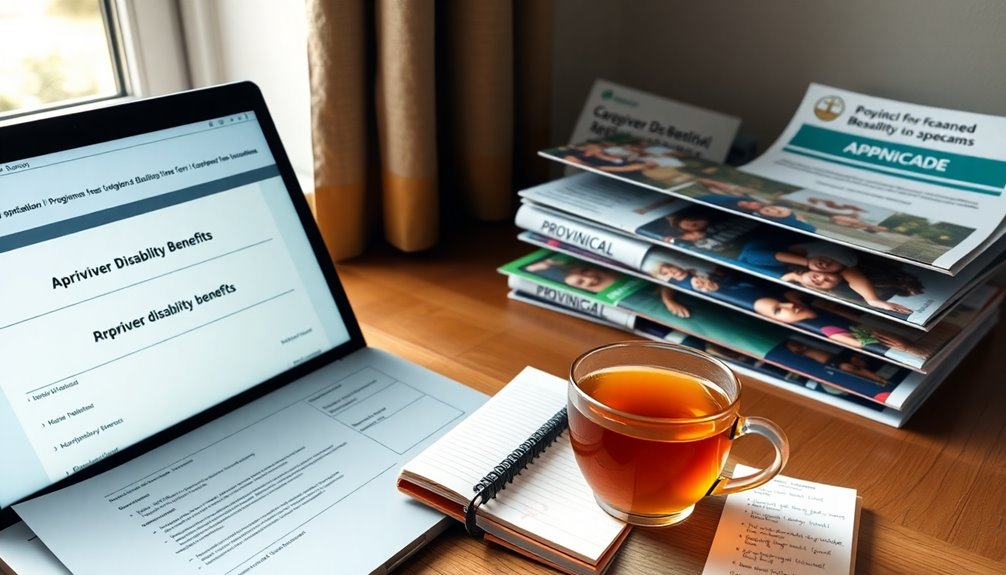To apply for caregiver disability benefits or grants in Canada, you'll need to gather necessary documents and confirm your eligibility. Start by obtaining a medical certificate for the care recipient and complete the Family Member Attestation Form. You can submit your application online via My Service Canada Account or by mail. It's important to apply as soon as you stop working to avoid losing benefits. Discover more details on the types of benefits and the application process.
Key Takeaways
- Determine your eligibility by confirming the relationship with the care recipient and obtaining required medical certification of their disability.
- Gather necessary documents, including medical certificates, Records of Employment, and completed Family Member Attestation Form.
- Apply online through My Service Canada Account or by mailing your application to ensure timely processing.
- Expect a decision on your application within eight weeks, with benefits arriving within nine weeks after approval.
- Utilize additional resources, such as provincial programs and community support groups, for further assistance and guidance.
Understanding Caregiver Disability Benefits

Understanding caregiver disability benefits is essential if you're stepping into the role of a caregiver for a loved one with a disability.
These benefits provide significant financial assistance when you have to take time off work to offer support. By applying for these benefits, you can ease the financial strain of caregiving responsibilities.
The application process usually involves submitting necessary documents, including medical certificates and employment records, which can be done online through My Service Canada Account or via mail.
Various federal programs, like the Canada Caregiver Credit and Employment Insurance Caregiver Benefits, can help you financially.
Eligibility Criteria for Caregivers

To qualify as a caregiver for disability benefits, you need to meet specific relationship requirements and provide medical certification.
You must show that you're offering vital daily assistance to someone with a disability while also confirming their eligibility for disability benefits.
Understanding these criteria is key for a successful application process.
Caregiver Relationship Requirements
While many caregivers are family members, anyone providing direct care or emotional support can qualify for caregiver disability benefits if they meet specific relationship criteria.
To be eligible, caregivers must demonstrate a significant relationship with the care recipient, which can include both family members and others regarded as family.
It's crucial to provide documentation from a medical professional confirming the care recipient's serious medical condition, which highlights the need for caregiver involvement.
Additionally, the Family Member Attestation Form must be completed by the care recipient or their legal representative to validate your role.
For caregivers of children under 18, a parent or legal guardian must sign this form to affirm the caregiver's relationship and their involvement in the child's care.
Medical Certification Necessities
Medical certification plays an essential role in determining your eligibility for caregiver disability benefits, as it establishes the necessity for your support.
You'll need documentation from a medical doctor or nurse practitioner confirming the individual's critical illness or injury. This certification must specify the duration of care required, ensuring benefits are allocated correctly.
If care extends beyond the initial approval, you'll need a second medical certificate to continue receiving benefits.
For those providing end-of-life care, it's vital to have a certification indicating the individual has a serious medical condition with a high risk of death within 26 weeks.
If you're sharing caregiving responsibilities, only one medical certificate is necessary, but it must detail the caregiving needs of the individual involved.
Types of Caregiver Benefits Available

When you're caring for a loved one, knowing the types of caregiver benefits available can make a big difference.
Federal options like Employment Insurance Caregiver Benefits and the Canada Caregiver Credit can provide essential financial support.
Additionally, various provincial programs may offer resources tailored to your specific needs.
Federal Caregiver Benefits Options
If you're a caregiver in Canada, you have several federal benefits options designed to support you in your essential role.
One of the key Caregiver Benefits is the Canada Caregiver Credit, which provides tax relief for those caring for family members with impairments.
For those needing to take time off work, Employment Insurance (EI) Caregiver Benefits offer financial assistance, covering up to 55% of your earnings while caring for critically ill or injured family members.
Additionally, Compassionate Care Benefits support caregivers providing end-of-life care, addressing both physical and emotional needs.
If you care for a child under 18 or an adult over 18 with a serious condition, Family Caregiver Benefits may also be available to you, requiring medical certification.
Provincial Support Programs Available
Across Canada, each province offers distinct caregiver support programs designed to address local needs and challenges.
In Ontario, the Caregiver Respite Program provides financial assistance, allowing caregivers to take much-needed breaks while securing temporary care services.
Alberta connects caregivers through Support Groups, fostering emotional and practical support.
In Quebec, the Aidants Naturels program offers local resources to help caregivers navigate their responsibilities.
Saskatchewan stands out with its Caregiver Tax Credit, which eases the financial burden for those caring for eligible individuals.
By exploring these provincial support programs, you can find the assistance you need, ensuring you're not alone in your caregiving journey.
Don't hesitate to tap into these valuable resources tailored just for you.
When to Apply for Benefits

Wondering when to apply for caregiver disability benefits? You should apply immediately after stopping work or reducing your earnings. Delays can lead to a loss of benefits, so a timely application is essential.
Keep in mind that a waiting period may apply based on your individual circumstances. To guarantee your application is processed smoothly, gather all required documents, such as medical certificates and records of employment (ROEs), and submit them alongside your application.
Don't forget to complete and sign all necessary forms, including the Family Member Attestation Form, by the appropriate individuals.
After submitting your application, follow up on its status to confirm receipt and guarantee timely processing of your benefits.
Required Documentation for Application

When you're ready to apply for caregiver disability benefits, gathering the right documents is vital.
You'll need a medical certificate confirming the individual's condition and proof of your relationship to them.
Let's go over the essential documents you should have on hand to strengthen your application.
Essential Documents Checklist
Applying for caregiver disability benefits requires careful preparation, and having the right documents on hand is essential for a smooth application process.
You'll need to gather these essential documents:
- A medical certificate confirming the individual's need for care, signed by a medical doctor or nurse.
- Records of Employment (ROEs) from all your employers to show your work history.
- An Authorization to Release Medical Information form to allow sharing of relevant medical details.
- A completed Family Member Attestation Form, signed by the individual needing care or their legal representative.
Make certain to submit all required documents promptly via My Service Canada Account, mail, or in person to guarantee timely processing.
Your diligence will make a significant difference in securing the support you need.
Medical Certification Requirements
To successfully apply for caregiver disability benefits, you must provide a medical certificate that confirms the individual's need for support.
This document should specify the serious medical condition requiring caregiver support and the duration of care needed.
If the individual is critically ill or injured, a medical doctor or nurse practitioner must complete the certificate, highlighting any significant risk of death.
For cases involving end-of-life care, it's crucial to indicate the high risk of death within 26 weeks.
If caregiver support is needed for an extended period beyond initial approval, you'll need a second medical certificate.
How to Complete the Application Process

Completing the application process for caregiver disability benefits is straightforward if you prepare ahead. First, gather all necessary documents, including proof of identity and health assessments.
You'll need to attest to your caregiving role and sign the application to confirm your unpaid status. Here are some key steps for caregivers to take:
- Verify all documentation is complete
- Double-check the accuracy of your information
- Keep copies of everything you submit
- Stay informed about any changes in your caregiving situation
Once you've submitted your application, expect a decision within eight weeks, with benefits initiated if approved.
Being organized and proactive will help ease the process, allowing you to focus on what truly matters—providing care.
Timelines for Application Approval

Understanding the timelines for application approval is vital for caregivers seeking disability benefits. Typically, you can expect a decision on your application within eight weeks from submission.
If your application is approved, benefits should arrive within nine weeks after you receive the approval notification. Timely submission of all required documents is important because delays can extend your overall processing timeline.
To stay informed, follow up on your application status to make sure that all documents are received and to address any issues that might arise. Be prepared for possible follow-up requests for additional health assessments, as these can further delay the approval timeline.
Staying proactive can help you navigate this process more smoothly.
Navigating Federal and Provincial Programs

While traversing the maze of federal and provincial programs for caregiver disability benefits can seem overwhelming, knowing your options can make the process smoother.
You can access various supports to help you provide care for your family, including:
- EI caregiving benefits that cover up to 55% of your earnings
- Tax credits like the Canada Caregiver Credit for financial relief
- Provincial programs offering respite care services tailored to your needs
- Local support groups connecting you with fellow caregivers
Gathering required documentation, such as medical certificates and proofs of caregiving, is essential for your application.
Each province offers unique financial assistance programs, so research your local options to guarantee you're maximizing the benefits available to you. Additionally, understanding tax implications can help you navigate potential financial benefits associated with caregiver programs.
Additional Resources for Caregivers

Caregivers can benefit from programs like Employment Insurance Caregiver Benefits and caregiver tax credits, designed to provide financial assistance. Many provinces offer unique support systems, including respite care programs, giving you temporary relief from your duties.
To find out about these benefits, check the Government of Canada and provincial websites for detailed eligibility requirements and application processes.
Additionally, community organizations often host caregiver support groups and workshops, fostering connection and resource sharing. They may also provide free tax clinics to help you maximize your benefits and navigate caregiving-related deductions. Furthermore, understanding maintenance rights and responsibilities can also provide caregivers with crucial information regarding financial support options available during challenging times.
These resources can greatly lighten your load and enhance your caregiving experience.
Common Challenges and Solutions in the Application Process

Maneuvering the application process for caregiver disability benefits can pose several challenges that may add to your stress.
Common hurdles include:
- Delays from incomplete documentation
- Confusion over medical certification requirements
- Difficulty traversing online applications
- Overlooking potential benefits like the Canada Caregiver Credit
To tackle these issues, gather all necessary documents, including medical certificates and Records of Employment, before applying.
Don't wait too long to submit your application; timely action can prevent losing benefits.
Confirm your healthcare provider understands the specific needs for medical certification.
Finally, familiarize yourself with the eligibility criteria of various programs to maximize your caregiver benefits. This understanding will not only help you secure the advantages you’re entitled to but also enable you to identify programs that align with your specific needs. If you’re considering a more long-term commitment to caregiving, researching how to start a caregiver business can provide you with additional opportunities to provide support while also earning a sustainable income. Utilize available resources and training programs to equip yourself with the knowledge necessary for success in this rewarding field.
With the right preparation, you can streamline the application process and secure the support you deserve.
Frequently Asked Questions
What Are the Requirements for Caregiver Benefit in Canada?
To qualify for caregiver benefits in Canada, you need to provide direct care to someone critically ill or injured.
You must be unpaid, over 18, and the person you're caring for can't be in a permanent care facility.
If you're applying for Compassionate Care Benefits, the individual must have a serious condition with a high risk of death within 26 weeks, confirmed by a medical professional.
Proper documentation is essential for eligibility.
How Do I Apply for Disability Allowance in Canada?
Imagine diving into a sea of paperwork, armed only with your wits and a pen.
To apply for a disability allowance in Canada, you first check your eligibility against the program's criteria. Gather essential documents like medical certificates and proof of income.
Fill out the application form carefully, submit it to the right authority, and brace yourself for the waiting game.
If denied, don't fret—you can appeal with more evidence!
What Is the Requirements for Applying Caregiver in Canada?
To apply as a caregiver in Canada, you need to meet specific requirements.
You must be over 18, providing unpaid care to someone critically ill or injured, and able to prove your essential role.
You'll need a medical professional's documentation confirming the care requirement and a completed Family Member Attestation Form.
Additionally, if applying for Employment Insurance benefits, gather your Records of Employment from your employers.
Your relationship to the individual in need matters too.
Can You Get Financial Assistance for Being a Caregiver Canada?
Yes, you can get financial assistance for being a caregiver in Canada.
Programs like Employment Insurance (EI) Caregiver Benefits provide a percentage of your earnings while you take time off work to care for someone.
The Canada Caregiver Credit offers tax relief for your contributions as a caregiver.
Additionally, Compassionate Care Benefits and provincial programs might also provide support tailored to your situation.
Exploring these options can help ease your financial burden.
Conclusion
Applying for caregiver disability benefits can feel overwhelming, but you're not alone in this journey. With the right information and resources, you can navigate the process and secure the support you need. Remember, every step you take is a step toward not just financial relief, but also peace of mind. As you advocate for yourself and your loved ones, think of the brighter days ahead. Your dedication deserves recognition, and these benefits can help light the way forward.









